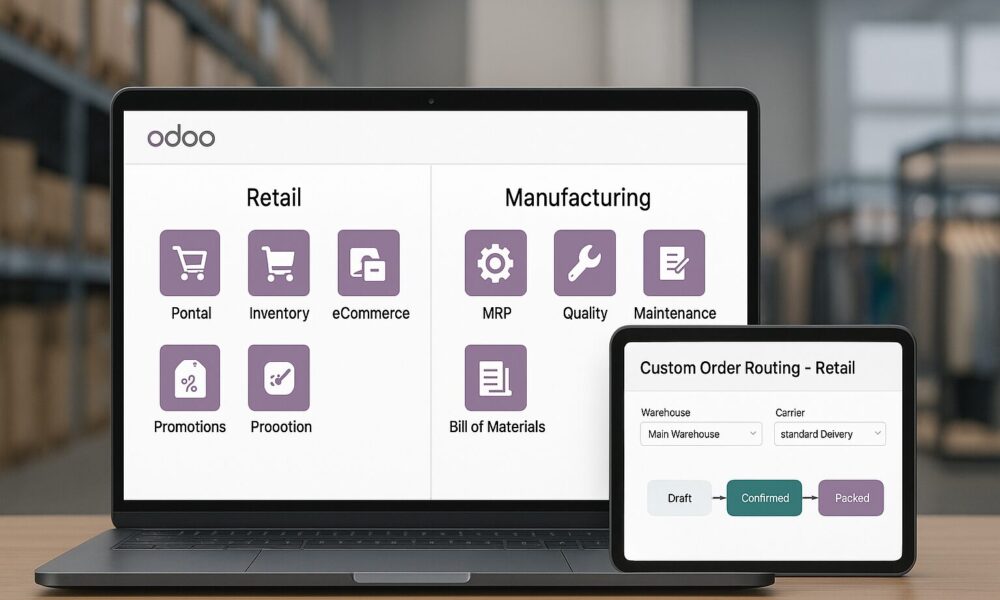How Odoo Customization Is Powering Industry From Retail to Manufacturing

Odoo’s flexible structure is changing the way companies use ERP systems. By focusing on real-world needs in industries like retail, manufacturing, healthcare, and education, Odoo customization is delivering measurable results without relying on rigid, one-size-fits-all tools.
The ERP Shift: Why Generic Systems Don’t Work Anymore
Most off-the-shelf ERP tools fail to address specific workflows. They create friction, limit growth, and often force teams to use inefficient workarounds. Today’s businesses need ERP platforms that support the way they actually operate, right down to the user interface, approval flows, and industry regulations.
That’s where Odoo stands out.
As an open-source platform with more than 30 core apps and thousands of modules, Odoo provides a solid base. But the real advantage comes through customization reshaping Odoo to match a company’s day-to-day processes.
Why Odoo Stands Out: The Framework Made for Customization
Odoo isn’t just modular, it’s adaptable at the core.
Built on Python, PostgreSQL, and XML, it supports both frontend and backend adjustments. Whether the goal is to automate payroll, manage inventory workflows, or integrate with a third-party system, developers can modify everything from dashboards to server logic.
With tools like Odoo Studio, companies can:
- Add custom fields
- Restructure menus
- Automate multi-step workflows
- Trigger actions without writing code
For more complex needs, Odoo offers full access to its backend logic and clean API integrations ideal for connecting IoT tools, CRMs, or payment systems.
Retail: Unified POS and Inventory Management
Retail businesses don’t just need billing software. They need integrated systems that track inventory, customer loyalty, taxation, and vendor data in real-time.
For example, one fashion chain rolled out a customized Odoo solution that included:
- A centralized POS across multiple outlets
- Real-time inventory syncing with barcode scanners
- Customer loyalty is linked to CRM records
- Multi-jurisdiction tax logic
- Shift-based sales reporting
The result? They replaced six separate tools with one connected platform. Employee training time dropped, and day-to-day operations became simpler and more transparent.
Manufacturing: Tools for Complex Workflows
Manufacturing operations demand precision. That includes machine-level visibility, raw material tracking, and dynamic cost accounting.
A mid-sized manufacturing unit implemented a custom Odoo build to support:
- Work order extensions with real-time operator tagging.
- Bill of Materials (BOM) logic that adjusts based on stock.
- Inline quality checks and automated rework tickets.
- Custom cost-tracking formulas tied to production batches.
With cloud deployment and real-time dashboards, teams could manage operations whether on the factory floor or off-site. Even shift leads could report machine faults directly from mobile devices.
Other Industries Adopting Odoo Customization
The adaptability of Odoo has made it popular across various sectors beyond retail and manufacturing. Let’s look at how other industries are using customization to their advantage:
Healthcare
- Managing patient records and doctor schedules
- Automated billing based on insurance logic
- Lab test tracking and integration with diagnostic tools
Real Estate
- Listing and pipeline management for property deals
- Commission tracking tied to agent performance
- Automated site visit scheduling with feedback collection
Education
- Lifecycle tracking from enrollment to graduation
- Gradebook-to-report card automation
- Payroll structures based on class hours or contracts
Each of these sectors requires logic that general ERPs simply don’t provide. Odoo’s custom modules helped these businesses build tools that worked for them, not the other way around.
What Customization Looks Like: UI, Logic, and Integrations
Customization isn’t just about writing backend scripts. It’s about aligning every part of the system with business needs.
User Interface Customization
- Role-based dashboards for different teams
- Visual indicators for status and approvals
- Language localization by region
Business Logic Automation
- Automated workflows for orders, tasks, or invoices
- Scheduled actions like payroll processing or backups
- Conditional approvals based on roles and hierarchy
System Integrations
- Payment gateways like UPI, Razorpay, and Stripe
- CRM integrations to import and sync customer data
- Logistics APIs for real-time shipping labels and tracking
By combining frontend control with deep backend access, Odoo becomes more than an ERP; it becomes an operating system for the business. Companies exploring Odoo Customization Services often benefit from this end-to-end flexibility, allowing them to shape the platform around existing processes rather than redesigning workflows to match rigid software.
Compliance, Security, and Scalability in Custom Builds
One common concern with ERP customization is whether it compromises security. With Odoo, it doesn’t when done correctly, it strengthens security.
- GDPR compliance with role-based access
- Full audit logs for actions and approvals
- Two-factor authentication for sensitive data
- SSL encryption for web-based access
- Automated daily backups for disaster recovery
- Scalable cloud hosting via Odoo.sh or AWS
This makes Odoo customization suitable for sectors handling critical data, like healthcare, finance, and logistics.
Final Thought
As we move further into 2025, businesses are shifting away from generic software. They’re demanding platforms that align with the way they work.
Odoo provides the foundation. Customization builds the bridge between what’s possible and what’s practical.
The result isn’t just software, it’s a system that fits the business like a glove.

Source: How Odoo Customization Is Powering Industry From Retail to Manufacturing




